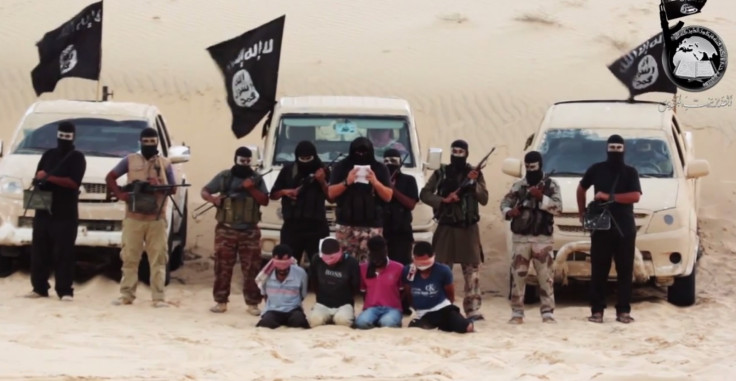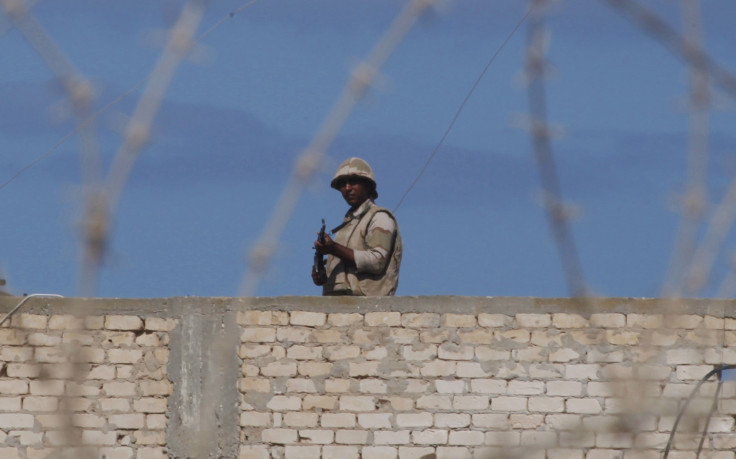Will the Final Conflict Between Israel and Isis be Fought in the Sinai Desert?

On the 16 February 2014, a packed bus of South Koreans was waiting in the midday sun to cross through the heavily guarded border from Egypt to Israel, on the east side of the Sinai peninsula.
The Korean tourists were members of the Jincheon Jungang Presbyterian Church. Many had reportedly saved up for years to afford what was for them a deeply special trip. They were in Sinai to visit St. Catherine's Monastery for the 60<sup>th anniversary of their church.
The Egyptian driver stepped off the bus to help two of the tourists collect bags from the luggage hold. As they reboarded the bus, a suicide bomber pushed past them and detonated his device. The blast killed the driver and three Koreans. Dozens more were injured, some terribly.
Later that day, a militant group, Ansar Bait al-Maqdis (ABM) claimed responsibility for the attack. Slowly, security sources unofficially confirmed that ABM were indeed responsible. It was the day the group found infamy in the mainstream media.
This week ABM raised the prospect of the ultimate Middle East conflict: Jewish Israel v the Isis (Islamic State), the ultimate Muslim insurgency. On Sunday, ABM, released an audio clip declaring their support for ISIS, according to media reports.
"In accordance with the teachings of the Prophet, we announce our pledge of allegiance to the caliph Ibrahim Ibn Awad ... to listen and obey him...and we call on all Muslims to pledge allegiance to him," a man reportedly identifying himself as a part of the group's "information department" said in the recording, referring to Isis leader Abu Bakr al-Baghdadi by his adopted name.
ABM first emerged in 2011 amid a security vacuum created by the ouster of former Egyptian President Hosni Mubarak. The group is believed to be based in the northern Sinai desert, close to the Israeli border. It is also believed to have some presence in the Gaza Strip, where it reportedly functions as a rival to Hamas.
Before February's bus attack, ABM were relatively well known to Israeli and Egyptian security forces, most notably for the 2013 Christmas Eve bombing of a police compound in Mansoura that killed 16 people, and for the failed assassination of Mohamed Ibrahim Moustafa, Egypt's Interior Minister, which caused the death of a British national. What will be of real concern, however, is the increasing sophistication of their attacks, their frequency, and the news of their alliance with Isis.
Since the removal of President Morsi in 2013, militant groups based in the Sinai have stepped up their campaigns of violence. Their attacks initially targeted the military and police in northern Sinai, but recent attacks have increasingly struck Cairo and the cities in the Nile Delta. But violence perpetrated by Islamic militants based in the Sinai is not new.
In the 1990s, Egypt suffered a wave of terrorist attacks, culminating in 1997's horrific attack on tourists at Luxor. These attacks were designed to provoke the government into enacting repressive measures that would lead to popular uprising. But the attacks had the opposite effect, galvanising support for Mubarak and enabling him to crush the insurgency.
The political situation in Egypt today is very different. The population remains deeply divided. And President al-Sisi has so far been unable to get to grips with ABM, whom many suspect are benefitting from external funding. But while the Egyptian regime attempts to link the group with the Muslim Brotherhood and Gulf states for political expediency, the reality is the organisation remains opaque. No one knows who leads it, how it is organised or the exact nature of its relationship with other militant groups in the Sinai.

The situation is deteriorating fast. On the morning of 12 November, a car was found ready to detonate with half a ton of explosives. In late October, Egypt was forced to declare a state of emergency in northern and central parts of Sinai following gun and bomb attacks which reportedly killed 31 soldiers.
While ABM attempts to link the group with the Muslim Brotherhood and Gulf states for political expediency, the reality is the organisation remains opaque.
Egypt will be increasingly reliant on its ongoing but uneasy cooperation with Israel to tackle the militants. Israel's leaders have some of the most advanced counter-insurgency apparatus in the world, but even they acknowledge that they are dealing with a dangerous enemy described by analysts as "the premier terrorist threat to Egypt". In particular, Israelis point to the recruitment by ABM of local Bedouin tribesmen, who have lived in the Sinai for generations and know how to use its unique geography to their advantage. Another worry is ABM's deployment of the "Manpad", a sophisticated surface-to-air weapon system, to bring down an Egyptian army helicopter earlier in the year.
The former CIA director David Petraeus called the development a "big deal". Because while ABM at the time had not deliberately targeted tourists, Manpads have the potential to track, lock on and bring down commercial aircraft. When, months later, ABM deliberately targeted the bus of Korean tourists, fears that the organisation could target foreign passenger planes grew. The destruction of flight MH17 over Ukraine has hopefully made that possibility more remote, as many airlines re-examined flight paths to prevent similar tragedies. Nonetheless, Egyptian, Israeli and Western intelligence services will be working as quickly as possible to locate the weapons.
Some analysts have argued that the Korean attack was an anomaly, and that Egyptian security forces and Israel will remain the primary targets of the organisation. Others argue that the new alliance with Isis changes the character of AMB, and will lead to more attacks on tourists. Either way, an increase in the level of cooperation between Israel and Egypt will be essential to tackle a dangerous and insidious organisation.
Ross Cypher-Burley is a former spokesman for the British ambassador to Israel, and now works for strategic communications firm Portland. You can follow him on Twitter here.
© Copyright IBTimes 2025. All rights reserved.






















